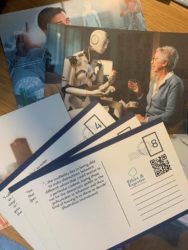In late November, our team participated in BE-PIN – Belgian Pandemic Intelligence Network’s “Getting ready for trouble” workshop and symposium on science communication during crises. What became immediately clear, across disciplines, countries, and professional roles, is that crisis preparedness is not simply a matter of protocols or technical expertise. It requires collaboration and concerted societal efforts … Continue reading “Getting Ready for Trouble: Science Communication, Ethics, and Crisis Preparedness”
Tag: policymaking
Public participation, ethical expertise and epistemic authority: lessons from the IPCC
Author: Dr Warren Pearce “This is to imagine that there could be a point where ethics and politics could perfectly coincide, and this is precisely what I am denying because it means erasing the violence that is inherent in sociability, violence that no contract or dialogue can eliminate because it constitutes one of their dimensions.” … Continue reading “Public participation, ethical expertise and epistemic authority: lessons from the IPCC”
Annual Board Meeting of the “Ethics & Expertise” Research Project
In a rare event of sunny and warm British summer, “Ethics & Expertise” project has brought together project team and Advisory Board to review the work done over the last year and set the direction for the next one. Over two days, we presented our emergent findings and ran a workshop with members of Ethox … Continue reading “Annual Board Meeting of the “Ethics & Expertise” Research Project”
New Code on Research Ethics during Pandemics: shifting narrative and practice on pandemic preparedness
Dr Marija Antanavičiūtė joins researchers and policymakers to discuss ethics during crisis in a launch of new code and book. On 3rd of June, at UNESCO headquarters in Paris the long-awaited PREPARED Global Code of Conduct for Research During Pandemics was launched. The code, available in 13 languages, sets out an operational ethics and integrity … Continue reading “New Code on Research Ethics during Pandemics: shifting narrative and practice on pandemic preparedness”
Cultures of expertise on Wikipedia
Author: Warren Pearce, University of Sheffield Alongside interviews with key advisors and policymakers, and our witness seminars which facilitate discussions between people with historical experience of the ethical advisory landscape, the project team are examining how cultures of expertise become configured in an important site of publicly accessible knowledge: Wikipedia. The website’s importance to the topic of ethical … Continue reading “Cultures of expertise on Wikipedia”
Ethics capabilities in civil service: reflections from a roundtable
This #GlobalEthicsDay, we’ve been reflecting at the ESRC “Ethics and Expertise” policy roundtable with UK experts on how science, policy and ethics intersect. We wanted to find out more about whether ‘ethics expertise’ and ‘ethics training’ are needed or wanted as part of the professional capabilities of civil servants, what kinds of forms this might … Continue reading “Ethics capabilities in civil service: reflections from a roundtable”
Ethics and Expertise in times of crisis: takeaways from the 2nd Advisory Board meeting
The ESRC-funded “Ethics and Expertise” project has been progressing over the last year and is currently in its data collection phase. In July 2024, researchers from participating institutions, including the Universities of Birmingham, Bielefeld, Sheffield, Melbourne, and Nuffield Council on Bioethics (NCOB), had the second meeting with the project’s Advisory Board in Berlin. The meeting … Continue reading “Ethics and Expertise in times of crisis: takeaways from the 2nd Advisory Board meeting”
Civic Epistemologies and comparative analysis
Author: Prof. Dr. Holger Straßheim This is Part 2 of Prof Staßheim’s reflections of international comparative analysis of ethics bodies and committees. Part 1 foced on the institutional embeddedness of ethics advice. In the last blog we explored how science-policy interactions, and by extension ethics – policy interactions are culturally and institutionally embedded. This helps us to … Continue reading “Civic Epistemologies and comparative analysis”
The institutional embeddedness of ethics advice
Author: Prof. Dr. Holger Straßheim This is Part 1 of Prof Staßheim’s reflections of international comparative analysis of ethics bodies and committees. Part 2 will focus on Civic Epistemologies. Probably one of the most pressing problems within recent studies of ethics advice and expertise concerns the institutional and cultural embeddedness of science-policy relations. In this … Continue reading “The institutional embeddedness of ethics advice”
Insights from “Rebuilding trust and integrity in the Australian Public Service” conference
Author: Dr Sarah Ball Our ESRC funded project “Expertise and Ethics in Times of Crisis” explores forms of ethical advice provided to governments and how that advice is perceived. While we are specifically focused on cases of crisis, the institutional forms and cultural norms surrounding the provision of ethical advice influence how and when that advice is … Continue reading “Insights from “Rebuilding trust and integrity in the Australian Public Service” conference”


